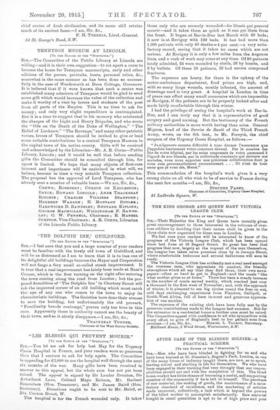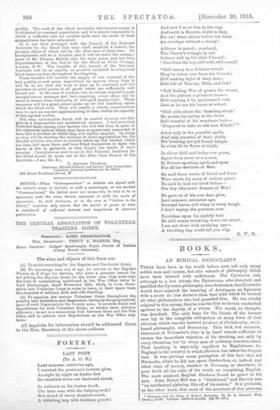AFTER CARE OF THE BLINDED SOLDIER—A PRACTICAL SCHEME.
[TO Tile EDITOR Or TRH " SeROYATOR.1 SIR,—Men who have been blinded in fighting for us and who have been trained at St. Dunstan's, Regent's Park, London, in one of the many forms of industry taught there, are now, so to speak, leaving school and starting in life for themselves. We who have been engaged in their training feel very strongly that our respon- sibilities should not end with the completion of this. The blind home-worker has little chance of becoming a useful, self-supporting member of the community if he is left to himself. The purchase of raw material, the making of goods, the maintenance of a satis- factory standard of excellence, and the marketing of articles made represent, collectively, a task which is beyond the powers of the blind worker to accomplish satisfactorily. Raw material bought in small quantities is apt to be of high price and poor
quality. The work of the blind inevitably deteriorates unless it Is subjected to constant supervision, and it is almost impossible to obtain a sufficient sale for articles made once the circle of local sympathizers has been exhausted.
So it has been arranged with the Council of the National Institute for the Blind that they shall establish a branch, the primary object of which will be the after care these men. Its headquarters will be in London, and it will be under the manage- ment of Mr. Thomas Martin, who for some years past has been Superintendent of the School for the Blind at Swiss Cottage, London, N.W. The benefits of this branch of the National Institute will be as rapidly as possible extended to competent blind home-workers throughout the kingdom.
These benefits will include the supply of raw material of the best quality at cost price, supervision by experts whose duty it will be to see that the work is kept up to standard, and the purchase at retail prices of all goods which are sufficiently well turned out. In the ease of workers who have been trained in such occupations as massage and boot-repairing, every effort will be made to secure them continuity of well-paid employment. These measures will to a great extent make up for the handicap under which the blind work. They will enable a steady, conscientious man to earn an amount approximating to that within the capacity of the sighted worker. But very considerable funds will be needed to carry out this plan in a businesslike and satisfactory manner. I feel sure that there are many among your readers who will feel that, in spite of the numerous calls to which they have so generously responded of late, this is another to which they will readily respond. In doing so they will be showing the measure of their appreciation for the blinded soldiers who have so bravely taken up the burden which has been laid upon them, and have fitted themselves to fight the battle of life as gallantly as they fought the battle of their country. Contributions sent to me at the National Institute for the Blind should be made out to the After Care Branch of the Institute.—I am, Sir, dm,
C. ARTHUR PEARSON,
Chairman, Blinded Soldiers' and Sailors' Care Committee; President, National Institute for the Blind.
226 Great Portland Street, W.















































 Previous page
Previous page